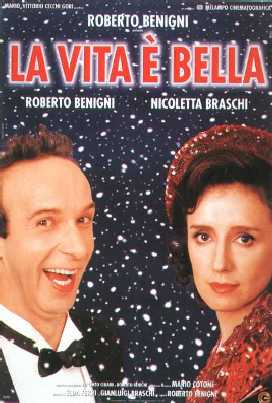- Life Is Beautiful
Infobox Film
name = Life Is Beautiful
caption = Italian film poster
director =Roberto Benigni
writer =Roberto Benigni Vincenzo Cerami
starring =Roberto Benigni Nicoletta Braschi Giorgio Cantarini Giustino Durano
producer =Gianluigi Braschi Elda Ferri
editing =Simona Paggi
distributor =Miramax Films (USA)
released = flagicon|Italy20 December 1997
flagicon|USA23 October ,1998
6 November ,1998
flagicon|Australia26 December ,1998
flagicon|UK12 February ,1999
flagicon|New Zealand5 March ,1999
flagicon|Hungary8 April ,1999
runtime = 116 minutes
language = Italian, German, English
imdb_id = 0118799|"Life Is Beautiful" (Italian: "La vita è bella") is a 1997
Italian language film which tells the story of a Jewish Italian, Guido Orefice (played byRoberto Benigni , who also directed and co-wrote the film), who must learn how to use his fertile imagination to help his son survive their internment in aNazi concentration camp .Title
The title derives from
Leon Trotsky 's [http://www.newyouth.com/archives/classics/trotsky/trotsky_testament.asp last testament] ; while in exile inMexico , expecting to die shortly from high blood pressure (or from agents loyal to his rivalJoseph Stalin ), Trotsky wrote,:"Natasha has just come up to the window from the courtyard and opened it wider so that the air may enter more freely into my room. I can see the bright green strip of grass beneath the wall, and the clear blue sky above the wall, and sunlight everywhere. "Life is beautiful". Let the future generations cleanse it of all evil, oppression and violence, and enjoy it to the full."Plot
The first half of the movie is a whimsical,
romantic comedy and oftenslapstick . Guido (Roberto Benigni ), a young Italian Jew, arrives inArezzo where he sets up a bookstore. Guido is both funny and charismatic, especially when he romances Dora (Italian, but not Jewish; portrayed by Benigni's actual wifeNicoletta Braschi ), whom he steals – at her engagement – from her rude and loud fiancé. Several years pass, in which Guido and Dora have a son, Joshua (written Giosué in the Italian version; portrayed byGiorgio Cantarini ). In the film, Joshua is around five years old. However, both the beginning and ending of the film is narrated by an older Joshua.In the second half, Guido, Guido's uncle Eliseo, and Joshua are taken to a
concentration camp on Joshua's birthday. Dora demands to join her family and is permitted to do so. Guido hides Joshua from the Nazi guards and sneaks him food. In an attempt to keep up Joshua's spirits, Guido convinces him that the camp is just a game – a game in which the first person to get 1000 points wins atank . He tells Joshua that if you complain for hunger you lose points, while quiet boys who hide from the camp guards earn points. He convinces Joshua that the camp guards are mean because they want the tank for themselves and that all the other children are hiding in order to win the game. He puts off every attempt of Joshua ending the game and returning home by convincing him that they are in the lead for the tank. Despite being surrounded by rampant death and people and all their sicknesses, Joshua does not question this fiction both because of his father's convincing performance and his own innocence.Guido maintains this story right until the end, when – in the chaos caused by the American advance drawing near – he tells his son to stay in a sweatbox until everybody has left, this being the final test before the tank is his. After trying to find Dora, Guido is caught, taken away, and is shot by a Nazi guard, but not before making his son laugh one last time by imitating the Nazi guard as if the two of them are marching around the camp together. Joshua manages to survive, and thinks he has won the game when an American tank arrives to liberate the camp, and he is reunited with his mother.
Music
The movie twice includes music from
Jacques Offenbach 'soperetta "Les Contes d'Hoffmann " ("Tales of Hoffmann "), with its melody "Barcarola". It is first played at an opera house before Guido and Dora begin their courtship; later, Guido surreptitiously plays it in an effort to communicate hope to his wife and others.Cast
*
Roberto Benigni - Guido Orefice
*Nicoletta Braschi - Dora
*Giorgio Cantarini - Giosué Orefice
*Giustino Durano - Eliseo Orefice
*Sergio Bini Bustric - Ferruccio Papini
*Marisa Paredes - Dora's Mother
*Horst Buchholz - Doctor Lessing
*Lidia Alfonsi - Guicciardini
*Amerigo Fontani - Rodolfo
*Pietro De Silva - Bartolomeo
*Francesco Guzzo - VittorinoAwards
The movie was shown at the
Cannes Film Festival in 1998, winning the Grand Prize of the Jury. It then went on to win the Academy Awards for Best Music, Original Dramatic Score and Best Foreign Language Film; Benigni won Best Actor for his role. The film was additionally nominated for Academy Awards for Directing, Film Editing, Best Picture, and Best Original Screenplay. It also received theGuiness World Record for the highest grossing film in Italian history.Fact|date=October 2008See also
* "
Train of Life " (1998), Directed by:Radu Mihaileanu
* "The Day the Clown Cried " (1972), an unfinished film byJerry Lewis External links
*imdb title|id=0118799|title=Life Is Beautiful
*" [http://artsandfaith.com/t100/2005/entry.php?film=95 Life is Beautiful] " at the [http://artsandfaith.com/top100/ Arts & Faith Top 100 Spiritually Significant Films] list###@@@KEY@@@###succession box
title=Grand Prix, Cannes
years=1998
before="The Sweet Hereafter"
after="Humanité "succession box
title=Academy Award for Best Foreign Language Film
years=1999
before="Character"
after="All About My Mother "
Wikimedia Foundation. 2010.
